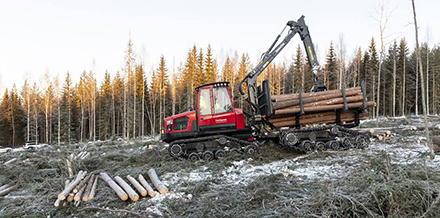A new type of forest machine is driving around the forests of Sweden. It combines a low-impact approach, increased productivity and an improved operator environment and is the result of a major cooperative project that has been under way since 2019. Source: Timberbiz
The concept machine is called Centipede and it has been developed by eight Swedish forestry companies and a forest machinery manufacturer.
The machine is currently being test driven and the results are promising.
Swedish forestry is facing major challenges and the issue of sustainability is the focus of attention. For this reason, Södra, Sveaskog, SCA, Holmen, Norra Skog, Mellanskog, Stora Enso and Billerud Korsnäs, as well as the forest machinery manufacturer Komatsu Forest, have jointly developed this new machine for low-impact forestry.
With its innovative technology, the Centipede is designed to ensure the most sustainable possible management of forests for both the environment and people.
Centipede has been developed to meet the challenges of forestry and offers three important benefits: Lower soil compaction, increased productivity and a better work environment.
“This is a comprehensive project, in which the parties are taking a long-term approach to promote sustainable forestry. In the project, we have fundamentally challenged today’s technology and taken a step into the future,” said Erik Nilsson, CTO of Komatsu Forest.
The machine is built to reduce the risk of ground damage, to increase transport speed and to reduce whole-body vibrations for the operator. The machine has a newly developed forestry track system, with a large support surface to minimize ground impact.
It also has a fully suspended chassis to handle uneven ground conditions, enabling the speed of the machine to be increased significantly without the corresponding increase in vibrations.
With this newly developed technology, Centipede can be driven on sites that are normally regarded as winter sites and on sites that are significantly impacted by precipitation.
In addition to being able to satisfy timber supply throughout the year and thus provide better prerequisites for profitable harvesting operations, Centipede has a number of characteristics that will directly increase production.
As a result of its innovative design, Centipede can move around the terrain significantly faster and can carry a larger load than the Komatsu 855, which was used as the benchmark. Both of these characteristics create conditions for significant increases in productivity.
Additionally, Centipede has demonstrated in simulations that fuel consumption is reduced by up to 15% in soft terrain, which is also positive for both the environment and for profitability.
An extensive preliminary study was implemented, and a new machine concept was developed during the project. The machine has been thoroughly evaluated through simulations and test drives. The comprehensive testing will continue in spring 2022 and decisions will thereafter be made about the project’s continuation.
“The forest industry and Komatsu are now jointly taking a major technology leap with a machine that is more gentle on the environment and the operator, at the same time as it enables a more efficient flow of timber,” said Magnus Bergman, manager for technique and digitalization at SCA Skog and Chairman of the project’s steering committee.
“With Centipede, we can meet the challenges arising from increasingly shorter periods of frozen ground and, for this reason, the machine is one of the most important development projects in forestry.”
Magnus Petersson, Head of Contractor and Technology Development at Södra said: “That those of us who are active in forestry know how important it is to cultivate the forest without damaging the ground. Our members who own their forests want to hand over land to the next generation that is managed with a low-impact approach. This enhances the forest’s financial, social and cultural values. By being involved in the development of the next generation of forest machine, we are doing something that is highly valued in family-owned forestry.”
Anders Järlesjö, Head of Forest Technology at Sveaskog said that minimizing ground impact in managed forests is an important issue.
“This is therefore a significant and long-awaited development and it is also fully in line with Sveaskog’s long-term orientation for more sustainable forestry. With this, we can see an opportunity for us in the forest industry to jointly take a major step forward with an efficient forest machine that is gentler on both the environment and the operator,” he said.






